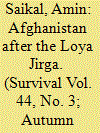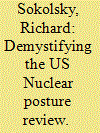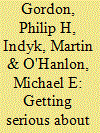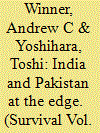|
|
|
Sort Order |
|
|
|
Items / Page
|
|
|
|
|
|
|
| Srl | Item |
| 1 |
ID:
022410


|
|
|
|
|
| Publication |
2002.
|
| Description |
47-56
|
| Summary/Abstract |
Dramatic change came to Afghanistan not because the world community suddenly decided that the Afghans were a people worth saving from the regime that was tormenting them, but because the Taliban's allies finally engaged in activities that directly harmed the United States. The 11 September attacks, ugly and deplorable as they were, brought an answer to the Afghans' prayers. At last, the only power capable of moving decisively against the Taliban and its supporters was forced to act. In the process, it had no choice but to engage the region more widely and deeply than it could have contemplated on 10 September. But if American policymakers expect to pull back from this engagement, limiting the US role to that of an ‘over-the-horizon’ actor, they should also expect further conflict and instability. The best hope for long-term peace depends on the United States engaging Afghanistan and its neighbours in the difficult task of nation-building.
|
|
|
|
|
|
|
|
|
|
|
|
|
|
|
|
| 2 |
ID:
022416


|
|
|
|
|
| Publication |
2002.
|
| Description |
133-148
|
| Summary/Abstract |
In early 2002, the Bush administration's Nuclear Posture Review (NPR) was unveiled officially and through leaks of confidential portions to the press. The release provoked immediate controversy. Yet supporters of the NPR have oversold its benefits while its critics have exaggerated its dangers. The NPR is neither a transformational nuclear strategy nor a dangerous path to nuclear armageddon. What is striking about the document is not so much the bold new directions that it charts, but its tinkering with policies that it claims to have rejected. This suggests that a great deal of the public and international response has been shaped as much by context as content. In the near-term, the most serious consequences of the NPR are the diplomatic and geopolitical problems it causes for America's standing and image in the world, rather than its direct effects on international security and the prospects for war and peace.
|
|
|
|
|
|
|
|
|
|
|
|
|
|
|
|
| 3 |
ID:
022413


|
|
|
|
|
| Publication |
2002.
|
| Description |
87-103
|
| Summary/Abstract |
Within a few months of 11 September, international efforts to combat terrorist-finance schemes were making rapid progress. Smaller jurisdictions that previously relied on financial and tax piracy for revenues were finding themselves seriously threatened with exclusion from the global financial services system, and were taking at least statutory measures to change their systems. Jurisdictions such as the Channel Islands and the Bahamas radically restructured their trust and company laws to make anonymity more difficult, and Liechtenstein began to adopt EU-like customer identification rules. Securities markets were recognising their susceptibility to abuse and were initiating new controls and procedures. By the spring of 2002, however, the intensification of the Israeli–Palestinian and India–Pakistan conflicts had diverted attention from efforts to combat illicit finance schemes. As a result, Pakistan and most of the Gulf States have yet to undertake much of the hard work necessary to create functional anti money-laundering and terrorist-finance regulation and enforcement.
|
|
|
|
|
|
|
|
|
|
|
|
|
|
|
|
| 4 |
ID:
022407


|
|
|
|
|
| Publication |
2002.
|
| Description |
9-22
|
| Summary/Abstract |
The regime in Iraq can be changed, and Saddam deposed. But it is a much bigger, more complicated and more costly task than the Afghan model – or much of the discussion in Washington – would suggest. America would be taking pre-emptive action to remove a regime in the heartland of the Arab world. If it succeeds, it would end or at least greatly diminish the Iraqi WMD threat. It could also reduce Western dependence on Saudi Arabia (as well as Saudi dependence on the West), and remove the need to keep American troops there, thus dramatically changing the dynamics of the Middle East. But America would also be shouldering a responsibility that the Bush administration has been reluctant to assume, at a time when the war in Afghanistan is not over and that nation has yet to be rebuilt. If America decides to go into Iraq, it had better do so with its eyes wide open.
|
|
|
|
|
|
|
|
|
|
|
|
|
|
|
|
| 5 |
ID:
022412


|
|
|
|
|
| Publication |
2002.
|
| Description |
69-86
|
| Summary/Abstract |
Nuclear war between India and Pakistan would be an unimaginable humanitarian disaster. The amount of outside assistance necessary to alleviate human suffering and to manage nuclear fallout throughout the region would be staggering. Such a conflict would also have consequences well beyond the subcontinent. The nuclear taboo, which has been in place for over five decades, would be shattered. If one side prevails decisively, others may come to view nuclear weapons as ‘normal weapons’ that can be used successfully to achieve political goals. A nuclear war could lead to two failed states on the subcontinent, permanently traumatising societies and disrupting the broader geopolitical order in Asia. The remnants of nuclear infrastructure could then fall into the hands of rogue commanders or terrorists, raising the prospect of multiple, nuclear-armed Afghanistans. A new strategy to lessen these dangers carries risks, but the potential costs of inaction are much higher. If they fail to grapple with the problem, the United States and other leading states should not be surprised if nuclear deterrence in South Asia fails.
|
|
|
|
|
|
|
|
|
|
|
|
|
|
|
|
| 6 |
ID:
022411


|
|
|
|
|
| Publication |
2002.
|
| Description |
57-68
|
| Summary/Abstract |
In the post-Soviet 1990s, the three key players in the geopolitical space around Central Asia – Russia, China and the United States – achieved a provisional equilibrium. Russia maintained its traditional dominance in its former southern provinces. China, as it developed its economic relations with the Central Asian countries, gradually increased its own political influence, while seeking to avoid confrontation with Moscow. The United States, despite its preoccupation with other areas of greater strategic significance, kept a wary eye on the region. After 11 September, this alignment of power has changed: the United States is now the region's main economic donor and security manager. The Bush administration needs to think clearly about the advantages and disadvantages of US dominance in Central Asia. The American presence in Central Asia threatens to offend Russian nationalistic sensibilities and make Putin's pro-US policy domestically very difficult. The optimal US approach to Central Asia is to establish leadership there in partnership with Russia. It is not in the American interest to corner Putin and deny him the opportunity to continue his policy of integrating Russia with the West.
|
|
|
|
|
|
|
|
|
|
|
|
|
|
|
|
| 7 |
ID:
022408


|
|
|
|
|
| Publication |
2002.
|
| Description |
23-36
|
| Summary/Abstract |
US–Iranian relations have been mired in an impasse whereby both parties demand fulfillment of certain preconditions before the resumption of diplomatic dialogue and economic relations. The failure to break through this stalemate has perpetuated a pattern of hostility, despite compelling common interests that were underscored by the 11 September crisis. It is time for not just a policy change but a paradigm shift. Washington should set aside any aspirations for wholesale engagement and official diplomatic relations, and instead focus on integrating Iran into the global economy and regional security order. This is the most promising means of encouraging Tehran to play a responsible role in the region. Through such a nuanced and multifaceted approach, Washington can deter Iran's provocative policies in short-term and cultivate a democratic transition in the long run.
|
|
|
|
|
|
|
|
|
|
|
|
|
|
|
|
| 8 |
ID:
022414


|
|
|
|
|
| Publication |
2002.
|
| Description |
105-115
|
| Summary/Abstract |
Energy security has traditionally been understood in terms of import dependence on foreign oil, and the threats to supply from war, instability or political embargos mounted by foreign suppliers. But there is also a risk closer to home. The move towards liberalised energy markets in Europe, the US and, to some extent, Asia could undermine both the long-term contracts which have underpinned the funding of big, long-distance gas pipelines, and the building of new nuclear power plants and renewable energy generators. Both are needed to meet the growing environmental requirement for carbon-free energy. Liberalisation does not, or should not, mean an end to all regulation by governments. The latter still have a role in setting the energy mix of their economies, maintaining and extending energy networks and grids, and ensuring adequate energy reserves. Governments need to take account of the impact that deregulation may have, particularly in Europe, on gas stocks at home and on price margins of producers abroad.
|
|
|
|
|
|
|
|
|
|
|
|
|
|
|
|
| 9 |
ID:
022415


|
|
|
|
|
| Publication |
2002.
|
| Description |
117-132
|
| Summary/Abstract |
NATO is embarking on a second round of enlargement while consolidating a promising new relationship with Russia. Yet these achievements have been overshadowed by growing concerns that the alliance is becoming irrelevant. At the heart of these concerns is a yawning gap in military capabilities between the United States and its European allies. The answer is not to rehash old complaints about European foot-dragging or American drum-beating. Rather, NATO should refocus its stalled Defence Capabilities Initiative (DCI) on using defence transformation to build a small ‘Spearhead Response Force’, that is, a European force capable of being a lead-element in assertive NATO efforts to cope with new threats. A new defence initiative will make little progress if it merely streamlines the NATO command structure and pursues a compressed list of DCI measures in unfocused ways. There must be a clear concentration on the specific forces to be used for new missions, which must be fully equipped with the necessary capabilities
|
|
|
|
|
|
|
|
|
|
|
|
|
|
|
|
| 10 |
ID:
022409


|
|
|
|
|
| Publication |
2002.
|
| Description |
37-45
|
| Summary/Abstract |
The United Nations mission in Afghanistan adopted the guiding principle that it should first and foremost bolster Afghan capacity – both official and non-governmental – and rely on as limited an international presence and on as many Afghan staff as possible. This has come to be referred to as the ‘light footprint’ approach, a stark departure from the expansive UN mandates in Kosovo and East Timor. This is in keeping with the limited role accorded to the United Nations in the Bonn Agreement, negotiated in December 2001 after the rout of the Taliban by the United States and its foreign and local allies. But it also represents a philosophical challenge to the increasing aggregation of sovereign powers exercised in UN peace operations since the mid-1990s.
|
|
|
|
|
|
|
|
|
|
|
|
|
|
|
|
|
|
|
|
|